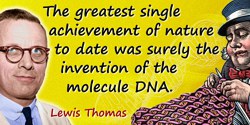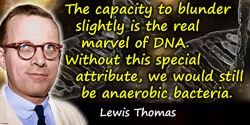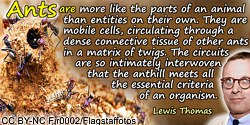 (source)
(source)
|
Lewis Thomas
(25 Nov 1913 - 3 Dec 1993)
American physician and author best known for his reflective essays on a wide range of topics in biology.
|
Lewis Thomas Quotes on Knowledge (6 quotes)
>> Click for 61 Science Quotes by Lewis Thomas
>> Click for Lewis Thomas Quotes on | Ant | DNA | Error | Gene | Language | Learning | Life | Mind | Nature | New | Science | Species | Truth | Universe |
>> Click for 61 Science Quotes by Lewis Thomas
>> Click for Lewis Thomas Quotes on | Ant | DNA | Error | Gene | Language | Learning | Life | Mind | Nature | New | Science | Species | Truth | Universe |
I am entitled to say, if I like, that awareness exists in all the individual creatures on the planet—worms, sea urchins, gnats, whales, subhuman primates, superprimate humans, the lot. I can say this because we do not know what we are talking about: consciousness is so much a total mystery for our own species that we cannot begin to guess about its existence in others.
— Lewis Thomas
In Late Night Thoughts on Listening to Mahler's Ninth Symphony(1984), 223.
I do not understand modern physics at all, but my colleagues who know a lot about the physics of very small things, like the particles in atoms, or very large things, like the universe, seem to be running into one queerness after another, from puzzle to puzzle.
— Lewis Thomas
In 'On Science and Certainty', Discover Magazine (Oct 1980).
Inexact method of observation, as I believe, is one flaw in clinical pathology to-day. Prematurity of conclusion is another, and in part follows from the first; but in chief part an unusual craving and veneration for hypothesis, which besets the minds of most medical men, is responsible. Except in those sciences which deal with the intangible or with events of long past ages, no treatises are to be found in which hypothesis figures as it does in medical writings. The purity of a science is to be judged by the paucity of its recorded hypotheses. Hypothesis has its right place, it forms a working basis; but it is an acknowledged makeshift, and, at the best, of purpose unaccomplished. Hypothesis is the heart which no man with right purpose wears willingly upon his sleeve. He who vaunts his lady love, ere yet she is won, is apt to display himself as frivolous or his lady a wanton.
— Lewis Thomas
The Mechanism and Graphic Registration of the Heart Beat (1920), vii.
It is not so bad being ignorant if you are totally ignorant; the hard thing is knowing in some detail the reality of ignorance...
— Lewis Thomas
In The Medusa and the Snail: More Notes of a Biology Watcher (1974, 1979), 74.
The overwhelming astonishment, the queerest structure we know about so far in the whole universe, the greatest of all cosmological scientific puzzles, confounding all our efforts to comprehend it, is the earth.
— Lewis Thomas
In Late Night Thoughts on Listening to Mahler's Ninth Symphony(1984), 16.
This is the element that distinguishes applied science from basic. Surprise is what makes the difference. When you are organized to apply knowledge, set up targets, produce a usable product, you require a high degree of certainty from the outset. All the facts on which you base protocols must be reasonably hard facts with unambiguous meaning. The challenge is to plan the work and organize the workers so that it will come out precisely as predicted. For this, you need centralized authority, elaborately detailed time schedules, and some sort of reward system based on speed and perfection. But most of all you need the intelligible basic facts to begin with, and these must come from basic research. There is no other source. In basic research, everything is just the opposite. What you need at the outset is a high degree of uncertainty; otherwise it isn’t likely to be an important problem. You start with an incomplete roster of facts, characterized by their ambiguity; often the problem consists of discovering the connections between unrelated pieces of information. You must plan experiments on the basis of probability, even bare possibility, rather than certainty.
— Lewis Thomas
The Planning of Science, The Lives of a Cell: Notes of a Biology Watcher, (1974) .
See also:
- 25 Nov - short biography, births, deaths and events on date of Thomas's birth.
- The Lives of a Cell: Notes of a Biology Watcher, by Lewis Thomas. - book suggestion.
- Booklist for Lewis Thomas.



 In science it often happens that scientists say, 'You know that's a really good argument; my position is mistaken,' and then they would actually change their minds and you never hear that old view from them again. They really do it. It doesn't happen as often as it should, because scientists are human and change is sometimes painful. But it happens every day. I cannot recall the last time something like that happened in politics or religion.
(1987) --
In science it often happens that scientists say, 'You know that's a really good argument; my position is mistaken,' and then they would actually change their minds and you never hear that old view from them again. They really do it. It doesn't happen as often as it should, because scientists are human and change is sometimes painful. But it happens every day. I cannot recall the last time something like that happened in politics or religion.
(1987) -- 


